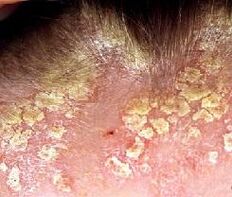
One of the most common forms of the disease is psoriasis of the scalp.
The disease itself is not an infectious process, but nevertheless the disease progresses in an inflammatory way.
The symptoms of psoriasis are very typical of fungal diseases - red or pink spots on the head, which have a different shape.
In addition to the formation of single or multiple rashes, itching, burning and inflammation appear on the skin.
Causes of psoriasis
Why does psoriasis occur on the head and what is it? Doctors still don't know why some people develop psoriasis of the scalp. Doctors periodically present new theories and refute old ones. The causes of the development of the disease are often associated with a genetic predisposition, and the factors that provoke its occurrence include:
- Genetic load: it has been shown that in parents with psoriasis, the probability of having children with this diagnosis is an order of magnitude higher.
- Violation of the formation and maturation of epidermal cells, according to one of the hypotheses, is the main reason for the development of the disease.
- It is also assumed that the reason is not in the epidermis, but in the immunity of the body, which produces the wrong factors that negatively affect the skin.
- Disruption in the endocrine system, according to some scientists, also contributes to the development of the disease.
At present, the most likely cause of the development of psoriasis is considered to be autoimmune processes in the body of a sick person.
Did you drop your hair?
Often patients suffering from a disease are interested in the question: can hair loss be observed in psoriasis? It should be noted that massive baldness does not occur. If such a process occurs, then in an insignificant amount, since the hair follicles are deep and the disease does not affect them.
Is psoriasis contagious?
This fear is associated with the unusual onset of psoriasis and its history. In ancient times, psoriasis was mistakenly considered a form of the terrible disease of leprosy. For the above reasons for the occurrence of psoriasis, it is clear that this disease cannot fall into the category of infectious. Therefore, the answer to the question of whether it is possible to become infected with psoriasis is one: no.
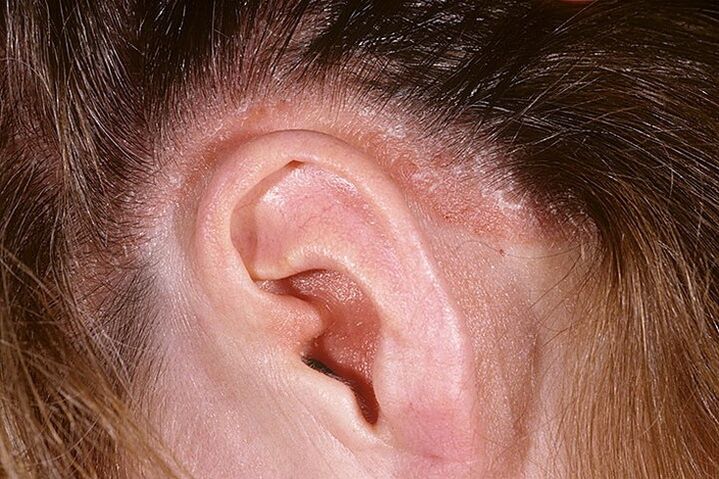
Symptoms
Scalp psoriasis is accompanied by the appearance of a characteristic rash on the skin, represented by spots or, more often, plaques ranging from pale pink to brownish red. In most cases, elements of the rash infiltrate from a palpable slight elevation above the level of healthy skin to a pronounced infiltration of more than 1 mm.
In the initial stages, only diffuse, without inflammatory manifestations and clear boundaries, abundant peeling in the form of dandruff is possible. It is very similar to other dermatoses of the head, which greatly complicates the differential diagnosis and treatment of psoriasis of the head.
The most typical symptom of psoriasis is the "psoriatic crown": the transition of the process from the scalp to the smooth skin of the adjacent areas of the forehead, to the areas above and behind the ears, to the posterior surface of the lobes of the ears. the occipital region and the back of the neck.
Depending on the area and severity of symptoms, there are 3 degrees of scalp damage:
- Easy- its main manifestation is the appearance on the head of small single lesions covered with small thin scales;
- Heavy- psoriasis affects the scalp completely, the size of the scales is much larger and they are much thicker than with a mild severity of the disease.
Clinical studies show that in most patients no single factor that can explain the onset of the disease can be identified. Very often, a combination of several of these reasons is observed, which gives reason to classify psoriasis as a polyetiological disease.
The difference between psoriasis and seborrheic dermatitis.
Differential diagnostic signs of psoriasis and seborrheic dermatitis:
- Psoriasis, unlike diabetes mellitus, is characterized by a more pronounced infiltration of elements of the rash due to acanthosis and hyperproliferation of the epidermis.
- The rashes in psoriasis often spread beyond the scalp, to the forehead (the so-called "psoriatic crown"), neck, and ears.
- The peeling with psoriasis is dry, with diabetes the scales are more oily.
- More pronounced itching is seen with diabetes.
It is also necessary to carefully examine and question the patient for nail and joint damage, the presence of which can speak in favor of psoriasis and significantly affect the further tactics of therapy.
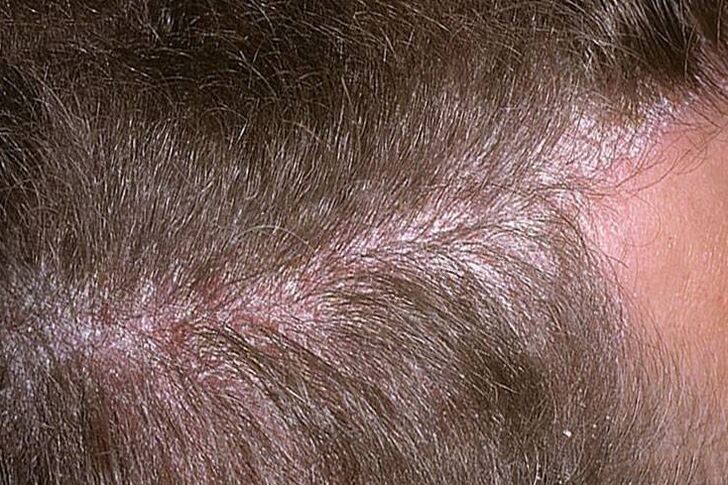
Scalp psoriasis treatment
When scalp psoriasis is diagnosed, a number of treatment measures are used, including:
- general therapy;
- local treatment;
- physiotherapy procedures;
- Spa treatment.
In mild cases of psoriasis of the scalp and the absence of progression, in most cases, it is enough to prescribe local drugs for treatment: shampoos, gels, ointments, tar, etc. At the same time, the therapy of a constantly progressive inflammatory process may require the use of a broader arsenal of pharmacological drugs from various groups and physiotherapeutic techniques.
How to treat psoriasis with medications?
In the complex of general therapy, doctors may include the following drugs:
- Vitamin complexes and vitamins C, A and group B;
- Nonspecific immunotherapy drugs: ATP, Aloe;
- Aromatic retinoids;
- Cytostatics;
- Hemodez Solution;
- Enterosorbents;
- Monoclonal antibodies;
- Immunodulators;
- Antihistamines;
- NVPS;
- Sedatives
- Calcified autologous blood.
The inclusion of corticosteroids and cytostatics in the course of treatment is advisable in severe psoriasis and significant severity of symptoms on the scalp. They must be used very carefully: such funds can provoke a worsening of the course of the disease.
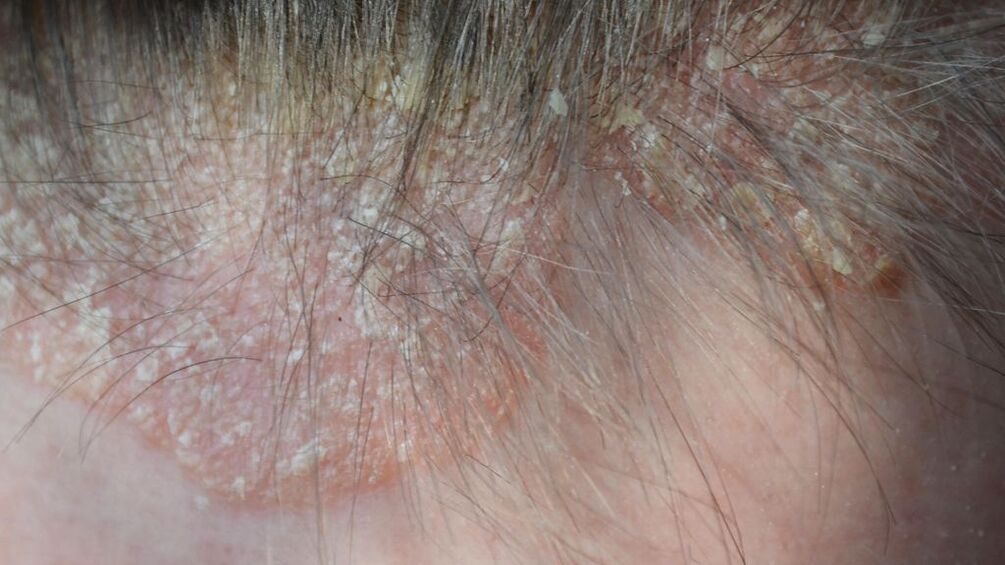
Scalp psoriasis shampoo
Is it possible to cure psoriasis on the scalp with shampoos? As a general rule of thumb, using even a very effective shampoo is not enough. However, the use of special curative agents in complex therapies is a prerequisite for successful treatment.
All medicinal shampoos help reduce the inflammatory process, relieve or reduce itching, but the use of a single shampoo is not effective; treatment must be comprehensive.
Ointments
Local treatment always helps to increase the effectiveness of the drug. In the progressive stage of psoriasis, salicylic 2% and boron-salidol ointments will be helpful. If there is an exudative component and severe inflammation, the appointment of corticosteroid creams and ointments will be required.
Non-hormonal ointments contain birch, pine, juniper, and coal tar. They can be produced both as ointments and as a paste.
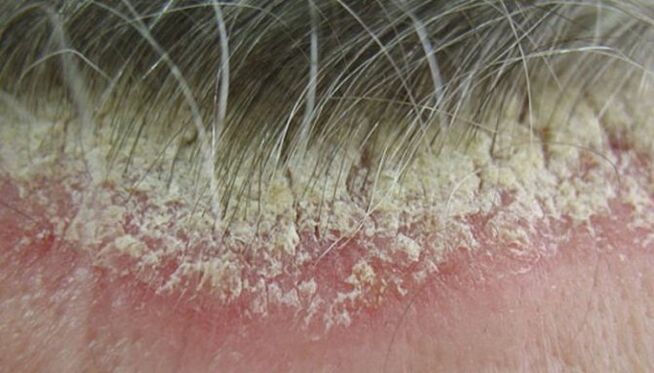
Diet for psoriasis of the head.
Nutrition must be uniform. Food portions should be small, based on "better less, but more often. "The last meal should be no later than between 19 and 00 hours, in the evening it is allowed to drink a glass of kefir or yogurt.
- It is necessary to completely abandon alcoholic beverages. Its use during the remission period can provoke an exacerbation.
- Fatty, spicy and smoked foods should be excluded from the diet.
- Sweets (cakes, pastries, chocolate, sugar) are also not recommended, all should be prohibited for psoriasis. Only small amounts of honey are allowed.
Of drinks, tea with sea buckthorn, rose hips or black currant leaves will be useful.
spa treatment
During your stay in hospitals, you will need to attend the following procedures:
- heliotherapy;
- mud therapy;
- hydrogen sulfide baths and hydrogen sulfide spring baths.
The course of treatment is carried out in special sanatoriums, they help to reduce the frequency of relapses and achieve a long-term remission.
PUVA therapy
PUVA therapy is a physiotherapeutic method of treatment that includes the use of a photoactive drug and irradiation of the skin with long-wave UV radiation.
Long experience of use and reviews of specialists demonstrate the effectiveness of PUVA therapy in the treatment of various dermatological diseases (including psoriasis), especially in the case of a persistent course and with the ineffectiveness of other therapeutic methods. According to statistics, a positive effect is achieved in about 80-85% of cases.
Rules for hair care
To achieve a better condition of your hair and scalp, you must adhere to the basic rules of care, in addition to the recommendations of a doctor:
- Wash your hair only with the recommended special shampoo.
- Comb the hair with a natural bristle comb.
- Systematically treat the scalp with disinfectant mixtures.
- Comb your hair very gently, delicately, without hurting the scalp.
- Try drying your hair naturally without using a hair dryer.
- With psoriasis of the head, you should avoid complex styling that requires the use of various styling products.























